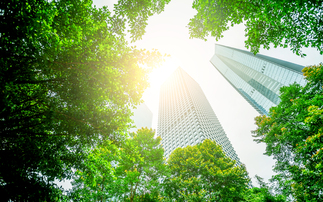How will the outcome of a Paris deal affect the way retailers and consumer goods companies do business?
Retail is a sector that is on the front line, in more ways than one. Certainly it is on the front line of customer opinion, feeling the brunt of everything from horsemeat scandals to food price spikes - but, thanks to its global supply chains, it is also the front line of changes to our climate.
Climate change is beginning to be seen as a major risk to retail business models by even the most cool-headed chief executive. Many retailers are now feeling the effects of a more volatile climate at the base of their supply chains - through unreliable harvests, prolonged droughts and more frequent storms.
IKEA is one company already feeling the strain. "With Hurricane Sandy we had to close nine of our stores in the US for a week, and we lost over $9m dollars in revenue from that one extreme climate incident," Joanna Yarrow, head of sustainability at IKEA UK, tells BusinessGreen.
Marks & Spencer's reports similar problems in the food industry. "A few people are treating climate change as a theory, we're seeing it as a reality when trying to source food from areas hit by flood and drought," says Mike Barry, director of Marks & Spencer's sustainability pathway, Plan A.
It's not just supply chains that are at risk. Volatile energy prices make securing power for superstores increasingly tricky, while customer sentiment is shifting to favour retailers, manufacturers, and brands taking positive action on climate, says Barry.
"What customers are saying is that they are concerned about the future - they want a good future for them and particularly for their children, and that's becoming ever more apparently in market research," Barry says. "Clearly they have issues about the here and now, the energy crisis, migration, security, but there's an overlay of long-term concern over the future and an expectation that big business - particularly the brands that they shop with - and government, address this."
In the next few decades, as people increasingly feel the direct effects of climate change through higher food prices and greater political and social instability, retailers without a positive reputation on climate may well bear the brunt of consumer anger.
In the face of such challenges, retailers are taking real, tangible steps to minimise their climate risk. For example, Kering - which owns a number of luxury fashion brands - uses a method of natural capital accounting to 'price in' environmental impact to its business model.
Meanwhile, the growing numbers of retailers signing up to clean energy pledges such as the RE100, under which companies - including Nike, Starbucks, IKEA and Walmart - have committed to completely switch to renewable electricity.
Yarrow says such a pledge makes business sense. "Energy prices will only on average go up, and they're unpredictable, so by investing in our own energy production that insulates us from price rises," she explains. She expects to see many more companies making similar pledges in the months after COP. "It just makes basic business sense, whatever you think about sustainability," she adds.
So in this context of voluntary action from the retail industry, what role does COP have? The key thing retailers are looking for from a Paris agreement is certainty, according to Alice Ellison, environment policy adviser at the British Retail Consortium (BRC). "I think that's really important because it provides retailers with certainty for investment and development," she tells BusinessGreen. Pier Luigi Sigismondi, chief supply chain officer at Unilever, agrees, adding that a "high level of ambition" at Paris will give certainty when making low-carbon investments around the world.
So what does "certainty" actually mean in the context of a Paris agreement? Members of the BRC are looking for a minimum baseline of carbon reductions, a legally binding agreement, and a five-year ratchet mechanism, according to Ellison. IKEA, meanwhile, is hoping for an overall carbon reduction target with a clear timeframe, along with interim targets that sets goals for actions such as renewables deployment and energy efficiency achievements.
Yarrow argues that clear, consensual targets will give retailers confidence that the world is heading together for a low-carbon transition. "One of the things that's really lacking at the moment is this confidence in direction," she says. "We hear from everyone, from our suppliers through to consumers, that there's a confusion about what might happen next and the direction we are heading in. The bolder and clearer the deal, the more cohesion we might see across the retail industry. At the moment I think it's arguably some businesses that are wanting to take the leadership on this. The more it becomes established as policy the less risk there is there for more organisations who perhaps see themselves as a follower or sitting on the fence on this issue."
It is looking likely that negotiators will reach an agreement in Paris that could provide some of the certainty retailers are looking for. Earlier this month the EU insisted a deal will be legally binding, and the INDC-led system has encouraged countries to set out in unprecedented detail their proposed paths to decarbonisation. Hopes also remain high that Paris will deliver a long-term emissions goal beyond 2030, while proposals for a five-year review period could require countries to commit to a 'no backsliding' principle - giving retailers a minimum baseline for action.
But in terms of specific policies, there is little on the table at Paris that will directly impact retailers right away, according to Barry. "I don't think there is going to be any one single piece of regulation or legislation that will come out of COP 21 that is directly impactful on the retail sector, but certainly sections of it, fractions of it, will continue to squeeze and expect action from the sector," he says.
For example, despite repeated calls from businesses for Paris to set a framework for a global carbon price, this is almost certain not to happen. But it may drive the development of individual carbon pricing schemes, Barry predicts. "There's not going to be one price of carbon coming out of Paris, but it will be the impetus for more and more jurisdictions, areas, countries, regions, to agree a price on carbon," he explains.
Similarly, Paris may act as a catalyst for more stringent regulation on food waste, the use of highly polluting chemicals for refrigerants, and deforestation, he says. In particular, Paris will create a "mood music" which will make food waste harder and harder to justify. Barry says retailers like M&S - and its competitors Tesco and Sainsbury's - have announced ambitious targets on food waste in an attempt to pre-empt post-COP regulation.
In some ways the sector would prefer one single regulation to come out of Paris, he admits. On carbon pricing, for example, a more ad-hoc approach - while much easier politically - will require retailers to be "carbon literate". "As a business you have got to be quite nimble at moving through this discontinuous landscape," he says. "You can't sit there and say 'there's one law, and in three years carbon will cost this'. It's much greyer than that. And retailers that are not carbon literate in that nuanced world will face some challenges in the next few years."
Of course, the chief executives of major retailers won't be gathered around the negotiating table thrashing out a deal next week. But retailers are more exposed than almost any other sector to the ebb and flow of public opinion, and COP 21 also presents a unique opportunity for retailers to tout their commitment to a customer base that is increasingly concerned about climate change.
While a number of public "engagement events" have had to be cancelled in the wake of the terror attacks earlier this month, retailers will still be on the ground in Paris talking to the media about their sustainability strategies. It could mark the start of a subtle shift in retail's relationship with its customers, as business begins to shoulder more of the responsibility for working to solve the climate crisis.
Unlike the fossil fuel or renewables industries, retail does not appear to have as direct a stake in many of the more fundamental issues on the table at Paris. But it may be the first of many sectors to really feel first-hand how climate change has the power to destabilise operations throughout an organisation, from a farmer stricken by drought to the angry complaints of consumers squeezed by rising prices.
For better or worse, Paris will be an indication of how efforts to tackle climate change will pan out. And for retail, straddling the gap between what the earth can supply and what consumers demand, that makes it a very important summit indeed.
This article is part of BusinessGreen's Road to Paris hub, hosted in association with PwC.








